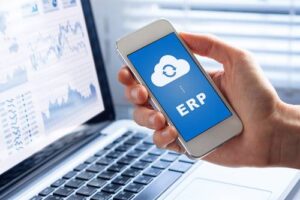What do broken heaters and gum disease have in common?
They inspire urgency. There’s nothing like small-scale disasters to get us to take action. If you look more closely, they also have something else in common: we take proactive measures so that they don’t happen in the first place. We service our HVAC systems and brush our teeth.
So why don’t we take the same measures when it comes to small business?
Most small business owners and managers make decisions about their immediate future. They see the need for a solution, so they find one. It seems like a reasonable process, but there’s a core problem they aren’t addressing: the long-term.
Whether you’re hiring new employees, adding a new location, or just expanding in general, you need a system that accommodates future growth. That includes having centralized and shared data, streamlined workflows, and connected sales and accounting divisions. For a small business or startup, it may seem like a tall order to get all of that with a single software application.
Fortunately, you can achieve a proactive approach to success with only three letters: ERP.
ERP Software, Defined and Re-Defined

Even if you’re familiar with the term, it might be different than the last time you checked. That’s because ERP software is rapidly changing, with a major value-add to small businesses and startups.
What is ERP software? ERP stands for Enterprise Resource Planning and is a business management solution that allows companies to function within one software system.
That works just fine for a current definition. But ERP has evolved significantly over the past decade, and it continues to change. Let’s dig into a brief history of ERP before we discuss where it’s headed. And, most importantly, why your business needs it.
ERP System Origins and Evolution
According to Ken Biddick of KB Consulting Group, “ERP was the holy grail of a system limited to production and manufacturing, with nowhere near the integration functionality it has today. Purchasing, production management, inventory control, and cost accounting all tied together and reported to the general ledger.”
At the time, it was revolutionary.
Today, ERP software is both more powerful and expansive. Simply, it puts the “e” in enterprise. ERP has become a much more holistic system; though still popular in production and manufacturing, it’s no longer limited to only those areas.

More organizations have embraced business software technology to run their multiple operations. At the same time, the marketplace of management options has become more crowded.
As ERP software vendors have scaled down their products to accommodate other industries and smaller-sized organizations, these products have become not only viable but practical and cost-effective solutions for SMBs.
The mass migration of software applications to the cloud has further opened up the world of ERP software. Widely considered a more secure data option, the cloud has also given ERP systems the flexibility to allow for mobile and field accessibility.
In the current climate, ERP systems give smaller businesses the ability to have a virtual back office. It allows them to focus on what they do best. Organizations that use cloud ERP systems waste less time on outdated or complex management processes.
There are still plenty of legacy products available. But newer enterprise applications have leveraged an understanding of modern business processes to create flexible and dynamic business management software.
How to Know When Your Business is Ready for ERP Software

Whether you own a one-person shop or have a startup with a handful of employees, most small organizations tend to work the same way. They purchase solutions as needs arise.
All businesses know that accounting will be central to their operations, so business owners get the popular accounting software.
Wash, rinse, and repeat that process with every operation your organization runs, and you’ve got a pile of software applications for everything— and a pile of bills to match.
Because ERP software can solve both immediate and long-term needs, it’s worth considering in place of individual applications. Here’s why:
Process
You can use the architecture of an ERP system to frame the way you work. Because a good system gives you complete visibility, you’ll do things right the first time.
Think of it the other way around: if you’ve constructed processes that take a long time, or that rely on multiple applications to work properly, you’ll need to re-learn them all eventually. Further, if a single thing goes wrong in one application, you can bet it will affect your entire workflow.
Finances
When your business becomes profitable, that’s reason enough to get excited about your future. But if you can’t get an accurate picture of your financial information, you might end up making mistakes that don’t become clear until far into the future.
Basing spending decisions on profit alone is the killer of many small businesses. Having an accounting system that produces high-quality, on-demand reports and integrates with every other division of your company is an excellent way to ensure you make the right decisions for your future.
Time

Let’s put it this way: the more reliant you are on software, the more difficult it is to change. That’s a great thing— if your software is doing what you need it to. If not, you’ll have trouble weighing the decision to upgrade due to the perceived pain and time it will take to migrate data onto a new system.
While it’s never too late to change, the sooner you can identify exactly what your needs are, the more time you’ll have to find, evaluate, and adopt a solution that works for you.
Conclusion
ERP software has come a long way since its inception. For any small business or startup organization, the takeaway should be this:
Enterprise management is no longer for only the midsize and large companies. While they used to be the only organizations that could pay for it, modern cloud ERP systems have become both flexible and affordable.
If you’re just getting started, you’re in a great position to be poised for future success with ERP software. If you’re running a small business, see how making smart changes now can make all the difference in your competitive edge.
This article is based on an interview conducted with Ken Biddick of Kenneth Biddick & Co. PC. Learn more about Ken’s accounting and consulting work.

